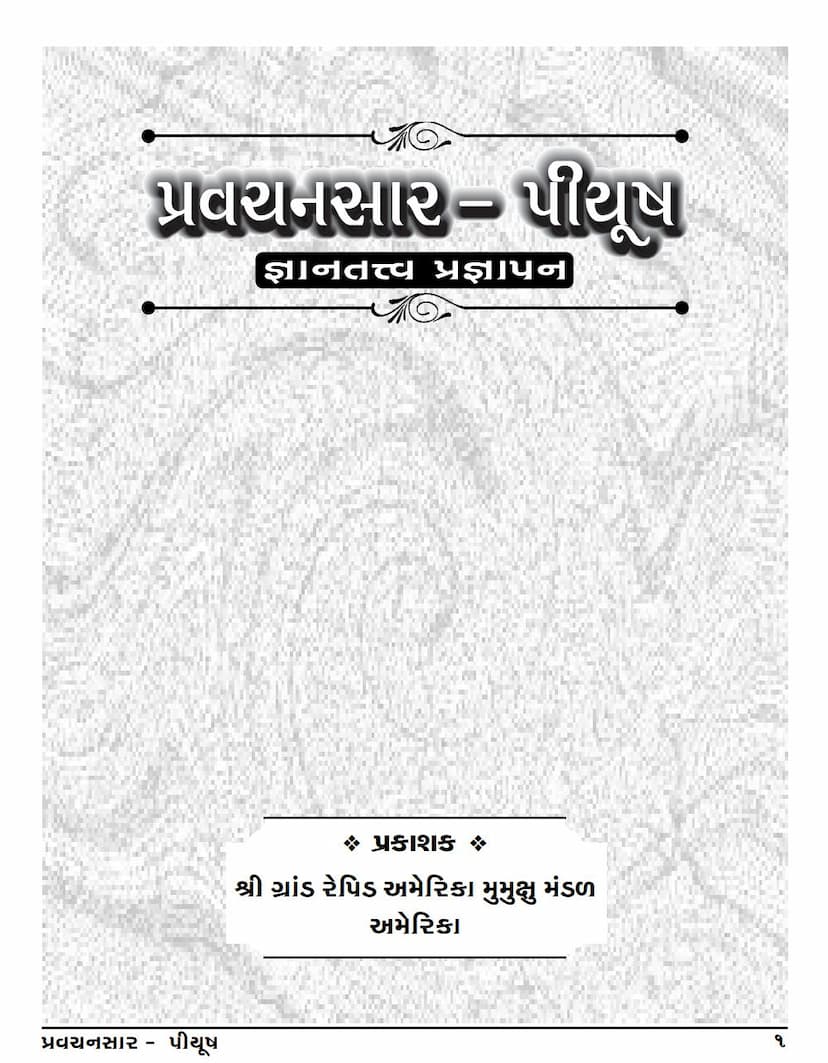Pravachansara Piyush Part 1
Added to library: September 2, 2025

Summary
This is a summary of "Pravachansara Piyush Part 1," authored by Kundkundacharya, Amrutchandracharya, and Himmatlal Jethalal Shah, published by Grand Rapid America Mumukshu Mandal America. The catalog link is provided for reference.
The book is a Gujarati translation and commentary on Kundkundacharya's "Pravachansara," a significant Jain text, with commentary by Amrutchandracharya and translated/commented by Himmatlal Jethalal Shah. The publisher is Grand Rapid America Mumukshu Mandal America.
Overall Purpose:
The book aims to make the profound teachings of the "Pravachansara" accessible to Gujarati-speaking Jain individuals seeking spiritual liberation (mumukshu). It emphasizes the importance of studying the original scriptures of the Acharyas and provides guidance on how to approach scriptural study, particularly focusing on the Soul (Atma) as the central point. The "Jnana tattva Pragnapana" (Knowledge Principle Elucidation) section, which forms a significant part of this volume, is highlighted for its detailed explanation of the Soul's inherent nature of knowledge and bliss, and the path to realizing it.
Key Themes and Content from the Provided Pages:
- Introduction and Gratitude: The preface expresses deep gratitude to the spiritual lineage of teachers (Kundkundacharya, Amrutchandracharya, Kahan Guru Dev, Pujya Behen Shree, Panditji) and the publishers for making this sacred knowledge available in Gujarati. It acknowledges the challenges of the current era (Dushamkal) and the necessity of such teachings for guiding souls away from the wrong path.
- The Nature of Jain Philosophy: The text highlights fundamental Jain principles discussed in the book, including:
- The rarity and purpose of human life.
- The nature of true happiness.
- The significance of the Vitrage (non-attached) Gods, Gurus, and scriptures.
- The true structure of the universe and the Soul.
- The concept of Anekanta (multi-faceted reality) and Syadvada (conditional predication) in Jain philosophy.
- The nature of knowledge and proof (Naya and Pramana).
- The root cause of suffering and its ultimate remedy.
- Focus on "Pravachansara" and "Jnana tattva Pragnapana": The introduction emphasizes the difficulty of studying "Pravachansara" but validates Pandit Himmatbhai's emphasis on its importance. The "Jnana tattva Pragnapana" chapter is identified as the first section of the "Pravachansara" (Shrutaskandha).
- Core Teachings of "Jnana tattva Pragnapana": This section delves into:
- The Soul's Nature: Explaining the Soul's innate qualities of knowledge and bliss, which are often veiled by ignorance. It states that the Soul is inherently knowledge and happiness.
- Ignorance and Attachment: Describing the state of an ignorant soul whose "capital" is sensory knowledge and sensory pleasure, leading to an erroneous identification with the body and an illusion of self in external objects. This is described as "Oshiayali Parasammukh Vritti" (dependent outward-facing inclination).
- The Path to True Knowledge: The text explains how, through the study of the nine fundamental truths (Navatattva) and the principles of "Pravachansara," the Soul's true nature can be realized.
- Emphasis on Kevali Jñana (Omniscient Knowledge): The Acharya's intense devotion to Kevali Jñana and the infinite bliss experienced by Kevalis is highlighted. The text stresses that only Kshyayika Jñana (the highest form of knowledge, achieved after the destruction of all karmas) is worthy of pursuit. Kshayaopashamika Jñana (partial knowledge) leads to the burden of karma. Direct knowledge (Pratyaksha Jñana) is true bliss, while indirect knowledge (Paroksha Jñana) leads to agitation.
- The Nature of True Happiness: The book explains that true happiness is inherent to the Soul (Atmika Sukha) and is attained through self-realization. It contrasts this with sensory pleasure, which is ultimately suffering.
- The Final Remedy: The last verses of this chapter briefly outline the Jina-prescribed method for eradicating delusion, attachment, and aversion.
- The Significance of Anekanta: The inclusion of "Namaha Anekantaya" (Salutations to Anekanta) in the initial invocations signifies the Jain emphasis on multiple viewpoints and the rejection of absolutist claims from other philosophies. The text aims to present the Anekanta nature of reality.
- The Nature of Moksha (Liberation): The book touches upon the state of liberation as the ultimate goal, characterized by pure, unbroken bliss and knowledge, free from all limitations.
Publisher's Role:
The publisher, Grand Rapid America Mumukshu Mandal America, is credited with making this spiritual text available, likely through the efforts of individuals like Shri Nitinbhai Bhimani, who signed on behalf of the Mandal.
Overall Message:
The introductory sections and content descriptions from the "Jnana tattva Pragnapana" reveal a text deeply rooted in Jain philosophy, aiming to guide seekers towards self-realization by understanding the Soul's true nature, the illusion of the material world, and the path of detachment and pure knowledge. It’s a spiritual guide focused on the internal journey of the Soul.